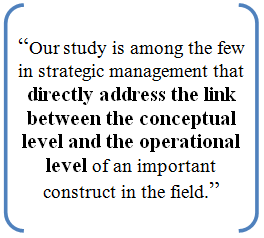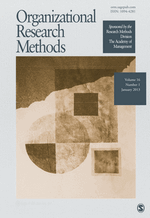What is Organizational Performance?
Editor’s note: We are pleased to welcome P. Maik Hamann, Frank Schiemann, Lucia Bellora, and Thomas W. Guenther, all of Technische Universitat Dresden, whose paper “Exploring the Dimensions of Organizational Performance: A Construct Validity Study” was published in Volume 16, Number 1 (January 2013) of Organizational Research Methods.
The raison d’être of management research is to prove that management instruments and management methods, such as strategic planning, zero based budgeting, or the balanced scorecard, are able to enhance organizational perf ormance. In addition, major theories in management research, for instance all contingency theories, include organizational performance as an important dependent variable in their conceptual arguments. But what is organizational performance? How can it be defined and measured in a reliable and valid manner? The Organizational Research Methods article “Exploring the Dimensions of Organizational Performance: A Construct Validity Study” provides answers to these questions.
ormance. In addition, major theories in management research, for instance all contingency theories, include organizational performance as an important dependent variable in their conceptual arguments. But what is organizational performance? How can it be defined and measured in a reliable and valid manner? The Organizational Research Methods article “Exploring the Dimensions of Organizational Performance: A Construct Validity Study” provides answers to these questions.
 Every time we review existing literature on the effect of management methods on organizational performance, we find it hard to compare results across studies. The contradictions between studies are mostly caused by different concepts and measurement approaches of organizational performance. If, due to completely different concepts and measurement systems, we are not able to combine study results, how can we as researchers even pretend to contribute to management research by the newest study applying a new construct measurement approach on organizational performance? Consequently, the interest into measurement approaches, construct validation and conceptual nature of organizational performance was triggered in our research team. After reviewing previous literature on this subject we recognized that no construct validation study addressing jointly the conceptual level of organizational performance and the construct validity of a comprehensive set of indicators at the operational level had been published before. This was the gap we wanted to close with our study.
Every time we review existing literature on the effect of management methods on organizational performance, we find it hard to compare results across studies. The contradictions between studies are mostly caused by different concepts and measurement approaches of organizational performance. If, due to completely different concepts and measurement systems, we are not able to combine study results, how can we as researchers even pretend to contribute to management research by the newest study applying a new construct measurement approach on organizational performance? Consequently, the interest into measurement approaches, construct validation and conceptual nature of organizational performance was triggered in our research team. After reviewing previous literature on this subject we recognized that no construct validation study addressing jointly the conceptual level of organizational performance and the construct validity of a comprehensive set of indicators at the operational level had been published before. This was the gap we wanted to close with our study.
Following Combs, Crook, and Shook (2005)1 we distinguish between operational and organizational performance. In this framework operational performance combines all non-financial outcomes of organizations. Furthermore, the conceptual domain of organizational performance is limited to economic outcomes. On this basis, we identify four organizational performance dimensions: profitability, liquidity, growth, and stock market performance. For each of these dimensions, we propose and test a set of construct valid indicators on a large panel data set with 37,262 firm-years for 4,868 listed US-organizations.
Interestingly, the growth dimension is troublesome under conditions of high environmental instability (e.g., in 2002 after the dotcom bubble or at the beginning of the financial crises in 2008). We perceive two possible explanations for this finding. First, growth is examined based on three aspects of size: sales, employees, and assets. These aspects differ in their reactivity with regard to increasing environmental instability (e.g., although sales might decrease immediately, investments already under way will be finished, thus increasing an organization’s assets base). Second, Higgins (1977)2 introduced the concept of a sustainable growth rate that must be in alignment with overall organizational performance, the financial policy, and the dividend payout ratio. If an organization grows at a rate above its sustainable growth rate, the other aspects (e.g., other dimensions of organizational performance) will eventually decrease. Fully developing these two arguments was beyond the scope of our article. However, they pose interesting research questions for future research on the growth dimension of organizational performance.
In summary, we propose a validated set of measurement indicators for the organizational performance construct for future management research. Furthermore, we highlight situations, in which construct validity is hampered.
1 Combs, J. G., Crook, T. R., & Shook, C. L. (2005). The dimensionality of organizational performance and its implications for strategic management research. In D. J. Ketchen (Ed.), Research methodology in strategy and management (Vol. 2, pp. 259-286). Amsterdam: Elsevier.
2 Higgins, R. C. (1977). How Much Growth Can A Firm Afford? Financial Management, 6(3), 7-16.
Read the paper, “Exploring the Dimensions of Organizational Performance: A Construct Validity Study,” online in Organizational Research Methods.





























































































An impreѕsive ѕhare! I have just forwarԁed this onto a coworker who had been conducting a littlе research ߋn this.
And he actually bought me lunch simply because I stumbled upon іt for him…
lol. So allow me to reᴡorɗ this…. Thanks for the meal!!
But yeah, thanks for spending the time to discuss this subject here on your web page.
No doubt the Emmanuel response is worth while and leads us in long way. The history of management, changing paradigm of work and organization made us learn that organizations are working not only for economic achievement only. The stakeholder are many and organization satisfy these stakeholder in many different ways. Resource based point of view of organization also confirm these stances, Moreover, conversion of resource theory also agreed to the similar point of view. In nutshell, the organization performance viewed in economic lens would be a limited one. We have to use multidimensional lens to grasps the organizational performance.
For me, limiting organizational performance to economic outcomes is deficient because, other behavioral outcomes contribute to the overall wellbeing of the organization. Thus, the organization comprises of both the physical structures, strategy, processes, and of course the humans who run the organization, among other things. Many organizations have collapsed not because they were not doing well economically but, because of character failure of some members of the organization. I will prefer the holistic approach in defining organizational performance rather than just economic performance.
recommended this article to all my students because it is exactly what the lesson was on this week thank you very much for this great article please refer back to my e-mail address and tell me if you have any other articles we can read.